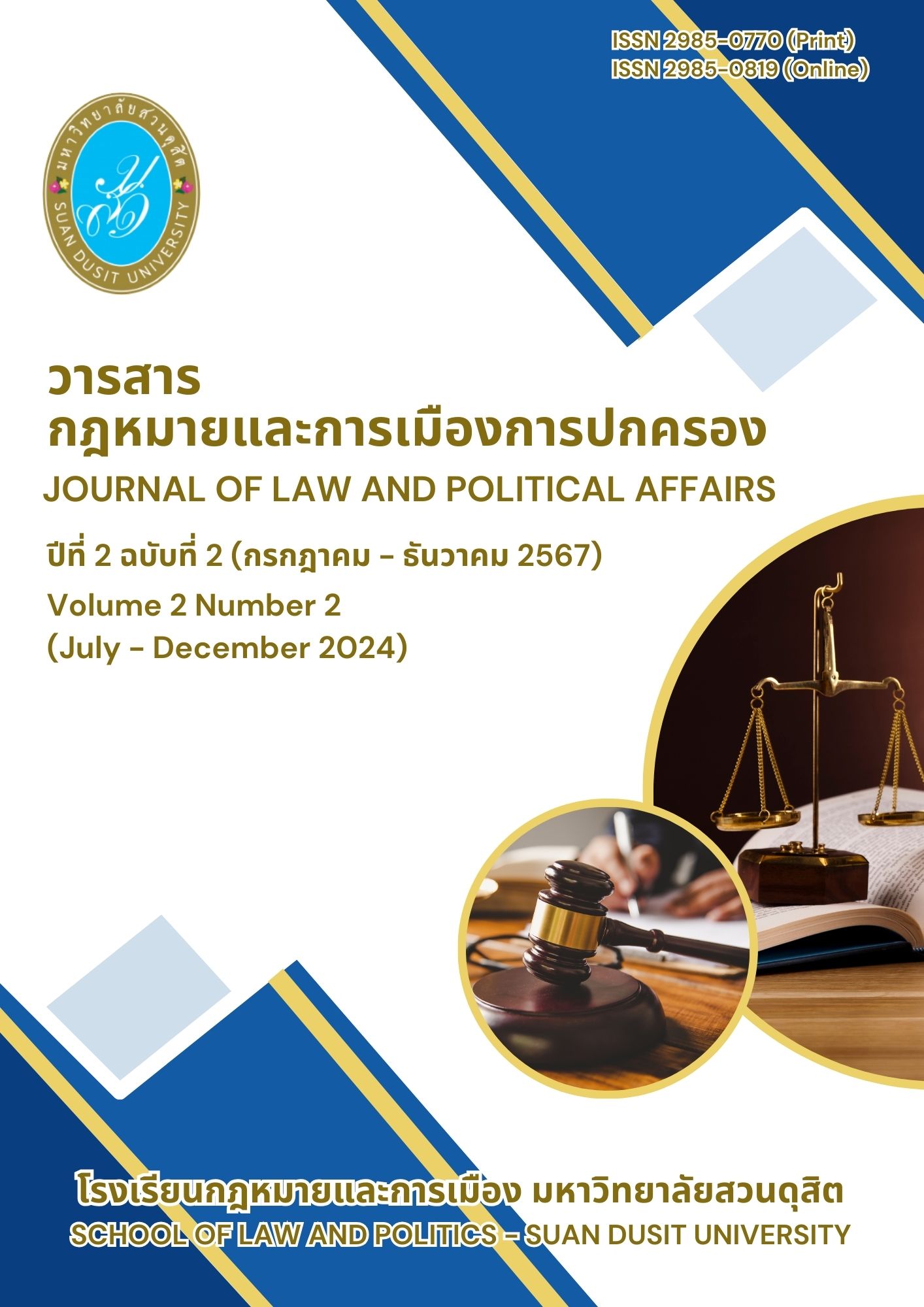An Analysis of the Components of Political Leaders from the Perspective of Generation Z Youth
Keywords:
Political Leadership, Generation Z YouthAbstract
Abstract
This research aims to study and examine the components of political leadership from the perspective of Generation Z youth, focusing on analyzing the leadership qualities that are important to this group and assessing the validity of these components. The sample consists of first-time voters in the 2023 election, aged between 18-22 years, selected through simple random sampling using Cochran's formula, resulting in a sample size of 385 individuals. Data were collected using a questionnaire, which was tested for reliability with Cronbach's alpha values ranging between 0.895-0.918, and for content validity by three experts, yielding values between 0.67-1.00. The data analysis employed descriptive statistics and confirmatory factor analysis (CFA). The research findings indicate that the component most valued by the youth is having a positive image, followed by personal qualities of the leader and support from various groups. The results of the validity analysis reveal that the six latent variables of political leadership—personal qualities of the leader, vision and policies, leadership style and engagement, positive image, support from various groups, and economic and social impact—are consistent with the empirical data. It is recommended that further research be conducted in the form of causal models to gain deeper insights that can be utilized in planning and promoting democracy among Generation Z youth effectively. Additionally, it is crucial for leaders to adapt to the use of technology and social media to effectively reach and communicate with this group.
References
Antonakis, J., & Day, D. V. (2018). The nature of leadership. 3rd. London: Sage Publications, Inc.
Auxier, B., & Anderson, M. (2020). Social media use in 2021. Pew Research Center. Retrieved on 30 July 2024 from https://www. pewresearch.org/internet/2021/04/07/social-media-use-in-2021/
Bass, B. M., & Riggio, R. E. (2019). Transformational leadership. 2nd. Psychology Press. NY.
Bolden, R. (2018). Distributed leadership in organizations: A review of theory and research. International Journal of Management Reviews, 13(3), 251-269.
Brown, A., Davis, C., & Evans, E. (2023). Democratic leadership styles and their impact on policy implementation. Journal of Political Leadership, 45(2), 178-195.
Corner, A., Roberts, O., Chiari, S., Völler, S., Mayrhuber, E. S., Mandl, S., & Monson, K. (2015). How do young people engage with climate change? The role of knowledge, values, message framing, and trusted communicators. Wiley Interdisciplinary Reviews: Climate Change, 6(5), 523-534.
Dalton, R. J. (2014). Citizen politics: public opinion and political parties in advanced industrial democracies. CQ Press.
Dimock, M., 2019. Defining generations: where millennials end and generation Z begins, Pew Research Center. United States of America.
Garcia, R., & Martinez, L. (2024). Balancing image and performance: A study of successful political leaders. Political Image Studies, 12(1), 45-62.
Johnson, M., & Lee, S. (2022). Effective communication of political vision: A key to public support. Communication in Politics, 33(4), 412-428.
Kaiser, R. B. (2018). The leadership imperative: An interview with Robert Hogan. Consulting Psychology Journal: Practice and Research, 70(1), 1-11.
Norris, P. (2002). Democratic phoenix: reinventing political activism. Cambridge University Press.
Northouse, P. G. (2019). Leadership: Theory and practice. 8th. Singapore: Sage publications, Inc.
Ohme, J. (2019). When digital natives enter the electorate: Political social media use among first-time voters and its effects on campaign participation. Journal of Information Technology & Politics, 16(2), 119-136.
Pew Research Center. (2019). Generation Z looks a lot like millennials on key social and political issues. Retrieved on 30 July 2024 from https://www.pewresearch.org/social-trends/2019/01/17/ generation-z-looks-a-lot-like-millennials-on-key-social-and-political-issues/
Seemiller, C., & Grace, M. (2016). Generation Z goes to college. CA: John Wiley & Sons.
Seemiller, C., & Grace, M. (2019). Generation Z: A century in the making. NY: Routledge.
Schroth, H. (2019). Are you ready for Gen Z in the workplace?. California Management Review, 61(3), 5-18.
Smith, J., Jones, A., & Williams, B. (2021). Emotional intelligence and political leadership: A comparative analysis. Leadership Quarterly, 36(3), 289-305.
Thompson, K., Anderson, R., & Taylor, S. (2020). Building alliances: The role of interest groups in political success. Political Alliances Review, 28(2), 156-173.
Turner, A. (2015). Generation Z: Technology and social interest. The Journal of Individual Psychology, 71(2), 103-113.
Twenge, J. M. (2017). iGen: Why Today's Super-Connected Kids Are Growing Up Less Rebellious, More Tolerant, Less Happy–and Completely Unprepared for Adulthood–and What That Means for the Rest of Us. NY: Atria Books.
Verba, S., Schlozman, K. L., & Brady, H. E. (1995). Voice and Equality: Civic Voluntarism in American Politics. Harvard University Press.
Wilson, E., & Chang, H. (2023). Sustainable development and political leadership: A long-term perspective. Jour
Additional Files
Published
How to Cite
Issue
Section
License
Copyright (c) 2024 Journal of Law and Political Affairs

This work is licensed under a Creative Commons Attribution-NonCommercial-NoDerivatives 4.0 International License.
ลิขสิทธิ์ต้นฉบับที่ได้รับการตีพิมพ์ในวารสารกฎหมายและการเมืองการปกครอง มหาวิทยาลัยสวนดุสิต ห้ามผู้ใดนำข้อความทั้งหมดหรือบางส่วนไปพิมพ์ซ้ำ เว้นแต่จะได้รับอนุญาตอย่างเป็นลายลักษณ์อักษรจากโรงเรียนกฎหมายและการเมือง มหาวิทยาลัยสวนดุสิต นอกจากนี้ เนื้อหาที่ปรากฎในบทความเป็นความรับผิดชอบของผู้เขียน ทั้งนี้ไม่รวมความผิดพลาดอันเกิดจากเทคนิคการพิมพ์







